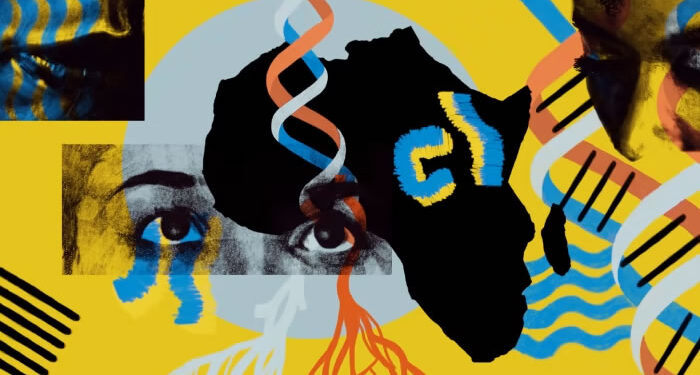Experts say the world is overlooking crucial medical breakthroughs by failing to study Africa’s rich genetic diversity. Only 2% of global human genome research includes African populations, leaving gaps in understanding diseases.
“Diversity” dominated discussions at last month’s Human Genome Organisation (HUGO) conference in Durban, South Africa. Despite being essential for genetic research, Africa remains one of the least explored regions.
Ambroise Wonkam, a Cameroonian scientist heading the African Society of Human Genetics, warns this gap creates major hurdles in diagnosing and treating genetic disorders.
“If we don’t know which genes are the most important in terms of diagnosing genetic diseases in African populations, it is impossible for me, as a medical geneticist, to treat an African child in the same way as I treat a European child,” he said.
Wonkam recalled working in Switzerland, where a single gene test identified the cause of deafness in half of cases.
“When I returned to the African continent, I tested Cameroonian children and black South African children, and zero percent of them had mutations in these genes,” he said.
Aimé Lumaka, a genetics professor at the University of Kinshasa, noted African patients rarely get clear diagnoses compared to those in Europe or North America.
“We compare the profile of the individual who has come to us with the genetic profile that exists in the databases, and as we cannot find certain profiles, we do not know the significance of certain African genetic profiles,” he said.
Why Local Data is Critical
The shortage of African genetic data hampers efforts to tackle conditions like sickle cell anemia, which affects African populations more severely. It also stalls global research. For example, a cholesterol-lowering drug was developed after studying Africans with naturally low cholesterol levels.
While humans share over 99.9% of their DNA, tiny genetic differences impact how bodies function. Since humanity originated in Africa, the continent’s populations carry the most diverse genes—making them vital for medical research.
“In fact, we need more data from Africa than from the rest of the world,” said South African geneticist Michèle Ramsay.
“Because if we look at the evolution of our species and the branches of our lineage, someone from West Africa has more genetic differences with someone from East Africa than someone from Europe has with someone from East Africa,” Ramsay said.
“So we can’t just look at general data on people of African descent across the continent, we need much more detailed, regional data.”
Progress remains slow. “Most genome studies focus on people of European ancestry,” said Ugandan researcher Christopher Kintu of Queen Mary University in London.
“The reason is obvious—it demands significant funding and infrastructure, which Africa often lacks.”
But costs are dropping. In 2001, sequencing a genome took a decade and cost billions. Today, it takes days and under $1,000 to decode DNA, the blueprint of our 23 chromosome pairs.
Each chromosome holds genes—cellular instruction manuals guiding bodily functions.
Ending ‘Helicopter’ Research
The $176 million Human Heredity and Health in Africa (H3Africa) initiative backed 50 projects over a decade. Though funding has ended, scientists continue work locally to fill data gaps.
South Africa aims to sequence 10,000 genomes as a first step toward analyzing 110,000 individuals.
“We’re going to start by sequencing around 10,000 genomes from a group of patients we’re already following over the long term, as a pilot phase to study feasibility,” said project lead Rizwana Mia.
The government is financing the initial phase.
Nigeria is gathering samples for a parallel project, pending funding. Crucially, African researchers are leading these efforts—countering “helicopter” research, where foreign teams extract data without local involvement.
“This leaves African researchers feeling that they have been used – and also the participants, whose samples and data have been collected,” said Deborah Ekusai Sebatta of Uganda’s Makerere University. “Genomic research is based on trust.”
Wonkam has bigger plans. With colleagues Nicola Mulder and Christian Happi, he proposes 10 African sequencing centers over the next decade, each with $10 million yearly budgets.
The project targets 300,000 genomes, though Wonkam believes 3 million are needed to capture Africa’s full diversity.
However, plans to base the coordination hub in Rwanda may draw criticism, given the country’s alleged ties to conflict in the Democratic Republic of Congo.
Viruses and Chronic Diseases
Genomics hasn’t yet fulfilled all expectations. Scientists are still deciphering how gene mutations interact with each other and the environment.
Predictive tests for disease risks often fail in African populations.
“We uncover countless genetic clues, but translating them into treatments takes years,” said Philippe Froguel of Imperial College London, who identified an obesity-linked gene in 1998. A related drug debuted just three years ago.
Some argue Africa should prioritize healthcare access over genetics. But researchers insist it’s urgent, as chronic illnesses like cancer and diabetes surge.
New studies explore how DNA influences viral responses. South Africa’s Veron Ramsuran found some people naturally control HIV without drugs.
“We have discovered that there are groups of individuals capable of controlling the progression of HIV and maintaining a low viral load, without being on anti-retroviral drugs. So we’re trying to identify which mutations or genes in these individuals might play a role.”
African genetic variants won’t yield quick answers, but scientists stress the continent must not be excluded from precision medicine’s future.
Despite dwindling U.S. health funding and political resistance to “diversity,” African researchers remain determined to unlock the genome’s secrets.




































